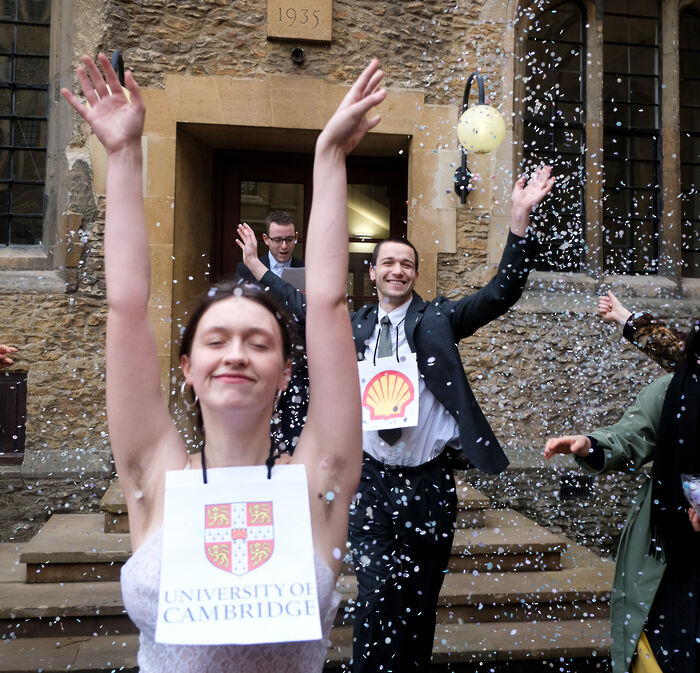Democracy is vital to the divestment process
Democratic principles and practice are central to the divestment campaign, argue Emrys Travis and Rob Day, in light of Monday’s meeting of the University Council

With the University Council set to discuss divestment in a key strategic meeting on 23 April, this could be seen as the time when mass movements are at their least important. Is there any point of student movements when a bureaucracy of experts is discussing the issue?
The actions of the divestment campaign continue to highlight the power of mass movements to hold the University to account, and their vitality to social, and climate, justice. Without mass campaigns, the chances for system change would be negligible. It is only by calling for greater democracy and more transparent processes, that an unaccountable University management will be brought in line with the will of those they claim to serve.
institutions like Cambridge should be run in the interests of the many, and by the voices of the many
Finance conversations are often cloaked in the language of expertise. They are discussed as if they were horrendously complicated issues only accessible to a select number of managerial experts. There are certainly rich complexities here – I personally wouldn’t like to switch Thursday mornings with anyone working in the finance department, I’m sure the whole thing would go horribly – but there are some fundamental questions that have to be decided upon before you get to the technical bit. The question at stake regarding fossil fuel investment is plain and simple: should Cambridge decide where to keep its money on the basis of maximum profit alone? Or do we have to take ethical considerations into account? When you reduce investment down to the complex technicalities of fund management, you’ve already answered that question without ever slowing down to consider it.
Over the past two years, the University Council ignored the issue of divestment, arguing that University investments in fossil fuels were already negligible. Indeed, despite the explicit links brought to light by the Paradise Papers leak in 2017, Vice-Chancellor Stephen Toope continued to claim that “we don’t know that we have investments in big fossil fuel companies” in an open meeting just last term. University management seem to contradict themselves: either the University has significant investments in unethical companies, in which case it has an ethical imperative to divest them; or its investments are negligible, in which case, why not divest them? Professor Toope’s explanation that some University investments are decided by external fund managers who are, apparently, unwilling to provide full transparency is inadequate; it is both a moral, and a financial, imperative that the University know where its money is going. You don’t have to work in the finance department to figure that one out.
It is here that democratic principles come in handy. These principles dictate that institutions like Cambridge should be run in the interests of the many, and by the voices of the many. The many within Cambridge have slowed down, backed up, and begun placing a sustainable future above finance. Over 300 academic staff have called for it; the members of Regent House have formally declared it; and the voices of those who have been rendered voiceless by the catastrophes of fossil fuel extraction have been demanding it – not to mention over 1,100 students in barely more than 24 hours. Outside the managerial bubble we can see that we need a change of plan, a U-turn of sorts: we call for divestment.
So it’s a good thing that Vice-Chancellor Toope, and his fellow University Councillors – who are set to meet to discuss divestment and transparency – have made promises to uphold those democratic principles. The question of divestment embodies a decision that goes to the core of what Cambridge wants to be: does it seek to be a socially transformative institution, a leader in championing what’s right; or an unaccountable corporation, driven to make as much money as possible? Do we want a university ruled by an oligarchy of white fossils who rubber-stamp anything sent their way by Big Oil? Or do we want to belong to a university that actually listens to the overwhelming will of its members? As a part of this institution, and an inhabitant of planet Earth, you have a lot at stake. And thankfully, you can have a say – a student petition which will be presented to Council can be found here.
The University claims it is run by the Fellows, and yet, bizarrely, it is an unaccountable University Council of empty white suits (and a few token students) that has the final say on the matter of divestment. The system has been organised against divestment for the last fifty years. This campaign, as well as the multiple other powerful, vital campaigns going on around Cambridge, highlights the fundamental importance of student activism. We are experiencing a unique period of change, where current systems are being openly challenged within our society. Democracy is active. Divestment is imminent. Join our campaign now!
 News / Ski mask-wearing teens break into Caius accommodation27 March 2025
News / Ski mask-wearing teens break into Caius accommodation27 March 2025 News / Trinity librarian loses discrimination case over denied term-time leave25 March 2025
News / Trinity librarian loses discrimination case over denied term-time leave25 March 2025 Fashion / The Cambridge puffer: a debate 27 March 2025
Fashion / The Cambridge puffer: a debate 27 March 2025 Lifestyle / Notebook: term time trips27 March 2025
Lifestyle / Notebook: term time trips27 March 2025 News / Uni offers AI ‘research clinics’ to academics and students 26 March 2025
News / Uni offers AI ‘research clinics’ to academics and students 26 March 2025





